Teaching award winners
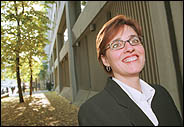 |
|
Distinguished Teaching Award (Undergraduate)
Diane Gauvin
Faculty of Management
Overprepare.
Be diligently thorough.
Be fair and understanding, flexible and consistent.
Treat students with respect.
Do not take yourself seriously.
Listen.
Enjoy.
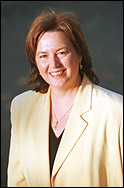 |
|
Carrie M. Derick Award for Graduate Teaching and Supervision
Susanne Lajoie
Department of Educational and Counselling Psychology
I would advise new faculty members to consider their classrooms as opportunities to involve students in their research culture. Think of your students as apprentices who should be competent at the same things that you yourself are good at. Your classroom can involve students in activities that will help them become active participants in the larger scientific community.
Try to show students why the topics you cover are exciting to you and why such knowledge will be important to them in their own life's work. It is also extremely important to realize that no two students are alike and that you must adapt your instruction to individual differences when it is feasible.
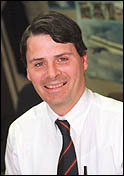 |
|
Distinguished Teaching Award (Graduate)
Louis Gialloreto
Faculty of Management
The simple thought I would very humbly offer is that it appears that teaching university students is a multifaceted endeavour, the recipe for which includes content, context, stimulation of self-discovery and a respect for learning from all its sources and in all its forms. Wrap all of this in a healthy dose of fun and one can unleash an astounding array of thinking and interaction which only serves to magnify the benefits of the process for all concerned.
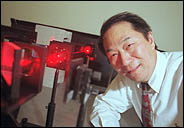 |
|
Engineering Class of '44 Outstanding Teaching Award
Yixin Shao
Department of Civil Engineering and Applied Mechanics
It is good news that more professors will be joining McGill's teaching and research team. Teaching and research are not necessarily in conflict. Instead, teaching skillfully may be less time-consuming and teaching well is more effective. New professors are expected to bring in new ideas and new technologies to the classroom to motivate students for life-long learning. As teaching is always a two-way street, professors will find a substantial pay-off from learning from their own students -- some of them will become valuable research assistants.
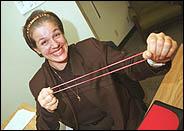 |
|
Centre for Continuing Education's Distinguished Teaching Award
Marie Melenca
Department of Languages and Translation
The advice I would offer to those who are new to teaching is twofold: First, make sure that you create a highly detailed course plan which allows for practical exercises. If one teaches a theoretical course, then prepare some questions for students to work on in pairs or in groups. The course plan helps ensure that you will not "blank out" as a result of the butterflies that appear at the beginning of a course. It also focuses on the target material and helps you keep track of the progress made in that particular course.
Secondly, get to know your students. While they are working in groups, circulate around the classroom and listen to each one. You might want to spend a few minutes with each group. This will allow you to see just how much was or wasn't understood by the students, and you can adjust accordingly.
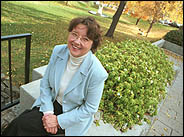 |
|
H. Noel Fieldhouse Award for Distinguished Teaching (Faculty of Arts)
Marianne Stenbaek
Department of English
Remember that your students are individuals with different backgrounds and resources and treat them like humans, not numbers. This is really the good old golden rule: Treat them as you would like to be treated ... with respect and care.
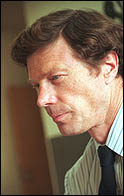 |
|
Samuel and Ida Fromson Teaching Award (Engineering)
David Lowther
Department of Electrical and Computer Engineering
Being available to students, being willing to understand their problems and see the difficulties from their point of view is necessary if you are to develop a relationship which will make you effective in the classroom. In terms of the courses I teach, students seem to like that it isn't just mathematics and theory -- the lectures involve practical examples from the world of electrical and computer engineering. The goal is to try to help students understand why they are learning particular material and where it fits in their training as electrical and computer engineers. In a sense, it's a holistic approach to the subject matter!
 |
|
Wood Award for Excellence in Teaching
Timothy Head
Faculty of Dentistry
Beyond the obvious of being an expert at what you teach and being prepared to teach it, I think that acting, toward students, as a colleague as well as a professor is an important aspect of helping them to learn.
 |
|
Macdonald Campus Award for Teaching Excellence
Terry Wheeler
Department of Natural Resource Sciences
Don't view teaching as a necessary chore, view it as the opportunity to show an audience why your field of research has kept you interested for as long as it has. This is the way to transmit enthusiasm and excitement for the work, not just facts and theories. A little enthusiasm early on can be the catalyst that launches a student on a career path.
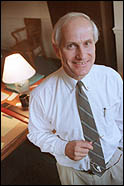 |
|
John W. Durnford Teaching Excellence Award (Law)
Dennis Klinck
Faculty of Law
I think that to be an effective teacher (which I have not always been), one has to find what is genuinely interesting about a subject, and at least have that interest oneself, and to be concerned about really communicating with the students. It's a combination of engagement with the materials, empathy with the students, personality, the chemistry on a given day, and luck. But it's not just a one-way street. We make a big mistake to focus on the professor. The class who nominated me for the award was a particularly sympathetic and supportive group: a lot of what contributed to my success (our success) on that occasion came from them.
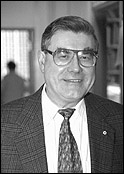 |
|
David Thomson Award for Excellence in Graduate Supervision and Teaching
Lawrence Mysak
Department of Atmospheric and Oceanic Sciences
Listen to as many seminars as possible, especially in fields outside your own, and observe from the best ones on just what makes a great/memorable presentation. Secondly, take time to listen and talk to the students a few minutes before each class, and hang around for a brief time after each lecture. It is an amazingly efficient way to pick up tips on how to improve your lectures.
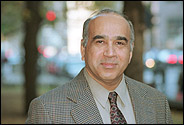 |
|
Centre for Continuing Education's Distinguished Teaching Award
Wajeeh Elali
Faculty of Management
In my opinion, effective teaching is an art that requires a great deal of diligence. A successful educator should not only enjoy teaching, but also should deliver at a high performance level. Above all, one must be able to create an atmosphere that fosters creativity as well as an overall enjoyment of the learning process.
 |
|
Faculty of Education's Distinguished Teaching Award
Elizabeth Wood
Department of Culture and Values in Education
Teaching is not something that is done to students. Rather, it happens with students, one at a time. University teachers need to acknowledge this, as they strive to meet the singular responsibility of their role. A teacher can make a tremendous difference in the life of a student; this must be honoured if the teaching challenge is to be met.
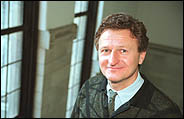 caption
captionPHOTO: credit |
|
Leo Yaffe Award for Excellence in Teaching (Faculty of Science)
Louis Hermo
Department of Anatomy and Cell Biology
My advice to the new wave of professors is: Start your course or lecture at the level of the student, i.e., assume they know nothing and build facts gradually; show enthusiasm and always keep a sense of humour; be committed to what you do and don't lose this with age; be approachable, kind-hearted and always ready to give a helping hand; use multiple imaging devices to get your message across; grade exams fairly, reserving some latitude for in-house errors. Best of luck to the new crop and may you be the eventual recipient of a teaching award.

